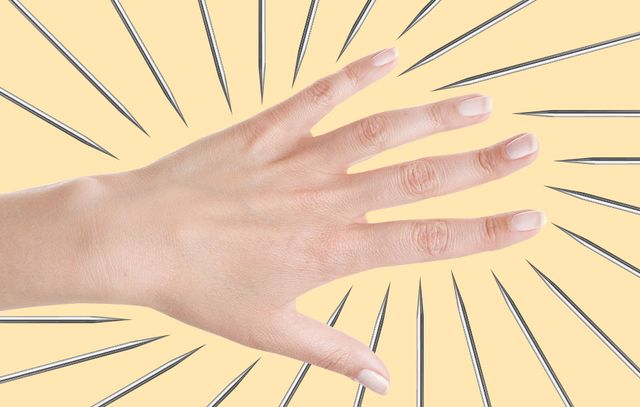You know that feeling when after sitting cross-legged for awhile, your foot feels totally foreign to you? Not only does it feel super tingly and uncomfortable, but poking and prodding doesn’t really seem to make a difference. Same thing happens when you’re scrolling through your Instagram feed for too long and that pins-and-needles sensation suddenly creeps through your hand.
It’s one of those things that makes you wonder: WTF is wrong!? Luckily, it’s likely nothing. The medical term for what’s happening is paresthesia, and it’s what occurs when there’s sustained pressure placed on a nerve, causing a burning or prickling sensation that goes away soon after it’s relieved, says Lisa Ashe, D.O., a board certified internal medicine physician based in Alexandria, Virginia. Here’s what you need to know.
When It’s Just Temporary
The medical world further breaks down paresthesia into more specific categories. “Saturday Night” paresthesia, for example, happens when someone falls asleep with their arm hanging over a chair (a.k.a. after one too many drinks). “The radial nerve in the arm is compressed, which results in a numb arm [when you wake up] that can also feel a little weak,” says Larry Burchett, M.D., a California-based family physician. Another one: “Honeymoon” parasthesia, which occurs when a similar peripheral nerve is compressed, happens when someone's sleeping on your arm all night.
We asked a hot doctor what's up when bruises take forever to heal—here's what he said:
RELATED: THE DE-STRESSING HABITS THAT ARE WRECKING YOUR SLEEP
“Both of these instances are considered transient paresthesias, or just temporary numbness that will go away,” says Burchett. “Once you stop compressing your nerve, it gets better within minutes or sometimes hours.”
Burchett says those temporary tingling sensations can also happen when your arteries are compressed. If you’ve ever given blood, you might remember the uncomfortable feeling shooting through your arm when the tourniquet is applied. A general feeling of tightness and tingling ensues while your veins bulge, he says. That happens because blood isn’t returning to the heart—at least, not until the tourniquet is removed and the temporary blockage of blood flow is released.
While this “falling asleep” sensation can occur in any body part where soft tissue can compress on nerves and blood vessels, areas protected by bone (inside the head and chest, for example) won’t be affected, says Todd Lanman, M.D, a world-renowned Beverly Hills spinal neurosurgeon.
RELATED: YOUR BLOOD TYPE MIGHT PUT YOU AT RISK FOR THESE DISEASES
When It Doesn’t Go Away
It's when those tingly feelings are triggered by repetitive motions that you just can't quit (ahem: texting) that things can become problematic. “When using your phone, you may also get compression of the median nerve at the wrist due to repetitive typing with your thumb,” says Lanman. So if you experience continual tingling in your thumb, index, or middle finger, it could actually be carpal tunnel syndrome, in which case medical evaluation may be necessary, says Clifford Segil, D.O., a neurologist at Providence Saint John’s Health Center in Santa Monica, California. Carpal tunnel syndrome can lead to further weakness and lack of coordination in the fingers and thumbs, and cause long-term nerve damage if left untreated.
RELATED: HERE’S WHAT TEXTING REALLY DOES TO YOUR SPINE
Another common side effect of paresthesia is temporary weakness in the hand, specifically in the ring and pinkie fingers. If that doesn’t go away after you’ve removed the compression and straightened out your arm, Lanman says your ulnar nerve, which is located in the elbow, may need to be evaluated too. It could indicate ulnar nerve palsy, a condition that causes muscle exhaustion and can even force the hand and fingers to move into a claw-like stature.
Regardless of where in your body it happens, if the tingling doesn’t disappear after you’ve relieved the pressure, then you may want to consider contacting your doctor—especially if weakness is involved, says Segil. Same goes if it’s happening in the same spot on a regular basis. A visit with a neurologist can help make sure there’s nothing more serious going on, he says.
How to Make It Stop
While you won’t necessarily be able to stop paresthesia from happening altogether, you can prevent it from happening quite so often. If the problem is in your hands and wrists, wearing a brace can help prevent compression of the nerve (many find relief while wearing it at night, says Burchett).
Otherwise, try to limit how often you Insta-scroll or troll through Facebook videos, and remember to get up and move. Compression of nerves and arteries tend to happen when you stay in one position for too long, so incorporating regular bouts of movement into your day can keep the pricks and tingles at bay. (Get tons of routines that''ll help you squeeze in quickie workouts with Women's Health's 20-Minute Workouts DVD.)
Jenn Sinrich is an experienced writer, digital and social editor, and content strategist covering health, fitness, beauty, and relationships. After a decade-long career in New York City working in the magazine industry and at a myriad of digital publications, Jenn returned to her hometown just north of Boston to pursue freelancing full-time.













